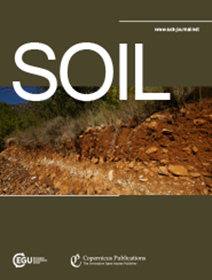耕作泥炭土地四年中适度复湿期间的碳平衡以及甲烷和氧化亚氮排放量
IF 5.8
2区 农林科学
Q1 SOIL SCIENCE
引用次数: 0
摘要
摘要我们在芬兰南部一个高度退化的农用泥炭土地进行了地下水位逐渐上升的试验,试验地块上种植了柳树、牧草和混合植被(set-aside)。我们测量了四年的二氧化碳(CO2)、甲烷(CH4)和一氧化二氮(N2O)排放量。2019-2022 年,地下水位年平均深度分别约为 80 厘米、40 厘米、40 厘米和 30 厘米。结果表明,地下水位每上升 10 厘米,土壤呼吸作用产生的二氧化碳年排放量就会减少 0.87 兆克 CO2-C ha-1。随着地下水位的升高,CH4 通量从吸收转变为排放,最大年平均排放率为 11 千克 CH4-C。氧化亚氮的排放量为每年 2 至 33 千克 N2O-N ha-1;在试验开始时,裸露土壤的氧化亚氮排放量较高,但在试验结束时有所下降。柳树的短期轮作在收获前实现了碳的净固存,但根据生态系统净碳平衡,所有处理和年份都出现了碳的净损失。总体而言,柳树短期轮作多年来的碳和温室气体平衡最理想(四年平均为 10 兆二氧化碳当量)。牧草和耕地处理的总温室气体平衡不低于 27 兆克二氧化碳当量/公顷-年-1,这凸显了在高度退化的耕地泥炭地抑制泥炭分解所面临的挑战。本文章由计算机程序翻译,如有差异,请以英文原文为准。
Carbon balance and emissions of methane and nitrous oxide during four years of moderate rewetting of a cultivated peat soil site
Abstract. We experimented a gradual water table rise at a highly degraded agricultural peat soil site with plots of willow, forage and mixed vegetation (set-aside) in southern Finland. We measured the emissions of carbon dioxide (CO2), methane (CH4) and nitrous oxide (N2O) for four years. The mean annual ground water table depth was about 80, 40, 40 and 30 cm in 2019–2022, respectively. The results indicated that a 10 cm raise in the water table depth was able to slow down annual CO2 emissions from soil respiration by 0.87 Mg CO2-C ha-1. CH4 fluxes changed from uptake to emissions with a raise in the water table depth, and the maximum mean annual emission rate was 11 kg CH4-C. Nitrous oxide emissions ranged from 2 to 33 kg N2O-N ha-1 year; they were high from bare soil in the beginning of the experiment but decreased towards the end of the experiment. Short rotation cropping of willow reached net sequestration of carbon before harvest, but all treatments and years showed net loss of carbon based on the net ecosystem carbon balance. Overall, the short rotation coppice of willow had the most favourable carbon and greenhouse gas balance over the years (10 Mg CO2 eq. on the average over four years). The total greenhouse gas balance of the forage and set-aside treatments did not go under 27 Mg CO2 eq. ha-1 year-1 highlighting the challenge in curbing peat decomposition in highly degraded cultivated peatlands.
求助全文
通过发布文献求助,成功后即可免费获取论文全文。
去求助
来源期刊

Soil
Agricultural and Biological Sciences-Soil Science
CiteScore
10.80
自引率
2.90%
发文量
44
审稿时长
30 weeks
期刊介绍:
SOIL is an international scientific journal dedicated to the publication and discussion of high-quality research in the field of soil system sciences.
SOIL is at the interface between the atmosphere, lithosphere, hydrosphere, and biosphere. SOIL publishes scientific research that contributes to understanding the soil system and its interaction with humans and the entire Earth system. The scope of the journal includes all topics that fall within the study of soil science as a discipline, with an emphasis on studies that integrate soil science with other sciences (hydrology, agronomy, socio-economics, health sciences, atmospheric sciences, etc.).
 求助内容:
求助内容: 应助结果提醒方式:
应助结果提醒方式:


